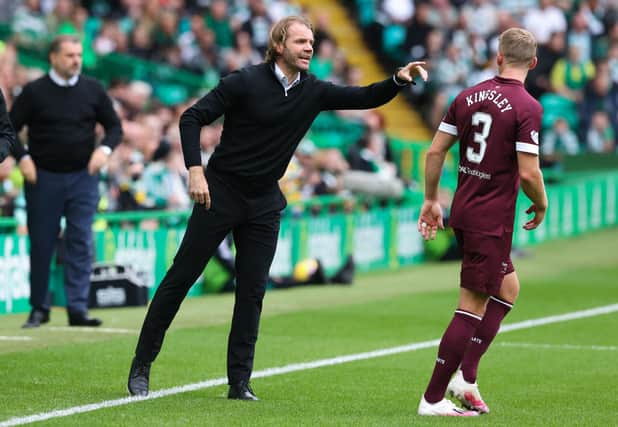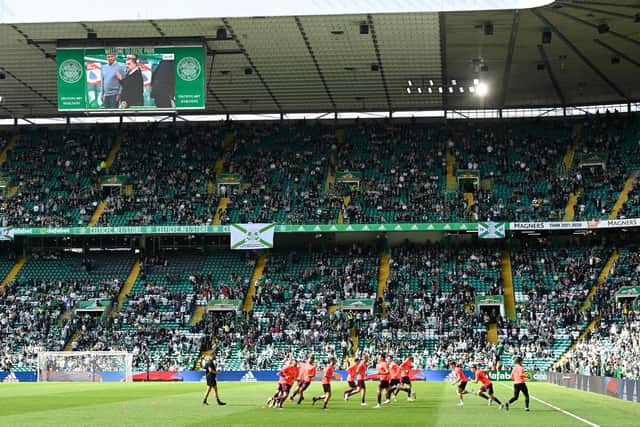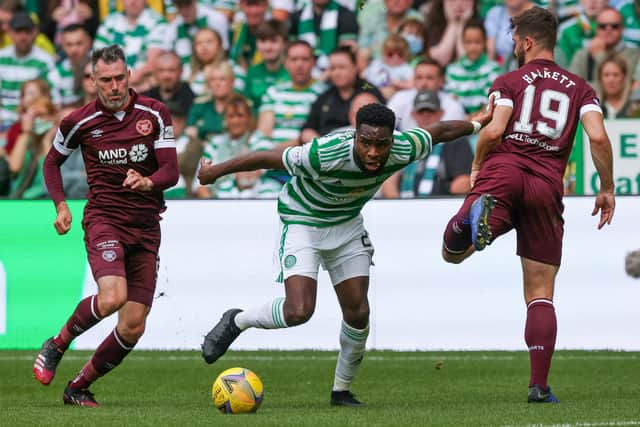Hearts: The stats which back up fans frustration and why Celtic defeat has to be a key learning point


Keep it tight, keep it organised, make it difficult for Celtic to play through the lines and hit on the counter-attack.
It isn’t a new strategy. It is one which is popular with visiting teams to Parkhead. One which has worked for teams before.
Although, not for Hearts in a very long time.
Advertisement
Hide AdAdvertisement
Hide Ad

The Capital club’s record at Celtic Park now stands at 19 losses and a draw since the club last won courtesy of a Michael Stewart penalty in a League Cup tie in 2009. In the past 20 matches, Hearts have scored just eight times, conceding 59. One positive is that Sunday was the first time they have scored two since 2007.
The reaction which followed the match was a mixture of frustration, anger and, perhaps most worryingly, resignation. That this is the norm when the team travels along the M8.
Don’t, however, confuse resignation for acceptance. Much of the anger surrounded a perceived lack of ambition, especially in the first half, and the fact that the team didn't make it difficult for Celtic.
The stats don’t make good reading in those first 45 minutes. For the squeamish amongst the Hearts support, don’t continue any further.
Advertisement
Hide AdAdvertisement
Hide Ad

Operation and patient
Celtic’s xG (the number of goals the team is expected to score from the chances created) was 3.38 from the first half alone, according to Wyscout. Hearts? Nothing, nada, zilch.
Possession share was 81 per cent to Celtic and just 19 per cent to the visitors. That reflected in the attacks per minute. The home side were at a relentless 0.96 attacks per minute. Hearts were down at 0.09.
In terms of possessions which reached the opposition box, Hearts had four in the entire game, to Celtic's 43. Those four worked out at just four per cent of possessions getting to the opponent’s box.
Manager Robbie Neilson’s assessment was that the pressing had failed and the side were “too passive”. Celtic were allowed 43 passes per defensive action (PPDA) in the first 45 minutes. A higher figure means a lack of pressing intensity. For context, the PPDA league average in the cinch Premiership is 10.28.
Advertisement
Hide AdAdvertisement
Hide AdWhat sums up Hearts’ inaction and inability to get close to Celtic more than anything is that the home side committed more fouls.
Former Aberdeen manager Ebbe Skovdahl once said that “the operation was a success, but the patient died” after a defeat at Parkhead.
For Hearts, the operation was a disaster, yet the patient remarkably clung on to the very end.
No regrets?
Neilson admitted he didn't have any regrets with the set-up, referencing the Scottish Cup final back in December when Hearts took Celtic to penalties. Although there were similarities, in the Hampden Park encounter, the Tynecastle side also didn't show much of an attacking element until after half-time.
Advertisement
Hide AdAdvertisement
Hide AdThe second half on Sunday showed that for all of Celtic's attacking quality – which there is plenty – there are vulnerabilities at the back, especially new boy Carl Starfelt.
When Hearts, with the introduction of Josh Ginnelly, started to provide greater support to Liam Boyce and turn the Swedish international it troubled and unnerved the hosts. Both the winger and Jamie Walker recorded the two highest average positions of the players used by Neilson.
Hearts were undone by not having the Englishman for the full 90 minutes, preferring to use him off the bench, and Armand Gnanduillet who could have proved useful at holding the ball up, imposing himself on Starfelt and relieving the defence of wave after wave of attacks.
The first half also showed the team need more from midfield. The three midfielders who started – Andy Halliday, Peter Haring and Beni Baningime – are combative, hard-working and adept at winning the ball back before shuffling it towards more attacking players.
Advertisement
Hide AdAdvertisement
Hide AdThere was a lack of an individual who would put his foot on the ball and try to wrestle control back from Celtic or drive forward to break the lines and open Celtic up. The hope is Cameron Devlin brings that to the team.
Yet, the biggest issue for fans will come back to the set-up as a whole when facing Celtic at Parkhead.
The Old Firm conundrum
Neilson didn’t put a team on the park to meekly exit the cup. Watching him on the sidelines, you could visibly see his frustration at how deep the team sat and how easily they gave up possession when they eventually caught a whiff of the ball. He tired to tweak the system seconds before the opening goal.
That will, however, mean little to his detractors, who viewed the first-half as a form of surrender, handing the initiative to a Celtic team who are a find attacking outfit.
Advertisement
Hide AdAdvertisement
Hide AdOn the other hand, It would be naive to suggest Hearts go at the Parkhead side with an uber-attacking line-up.
It is one of the more difficult conundrums for managers to solve when going to one of the Old Firm and it requires plenty of balance.
In hindsight, Haring, Halliday and Baningime are overkill in the centre of the pitch especially. Aaron McEneff and Walker could have provided a much better option at driving Hearts forward in transition and linking with the front two.
Sunday’s loss extends Hearts’ League Cup agony, and needs to be a key learning point for Neilson and the team, who have started the season well, when it comes to matches in Glasgow against Celtic and Rangers.
Advertisement
Hide AdAdvertisement
Hide AdSupporters will forgive defeat but not in a manner where the team are mere bystanders.
The next time Hearts are in Glasgow is at Ibrox in October. Fans will be keen to see a team who make it difficult for Rangers out of possession and a team who show much more ambition in possession. A repeat of Celtic will be hard to swallow.